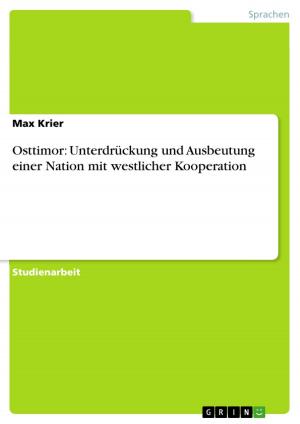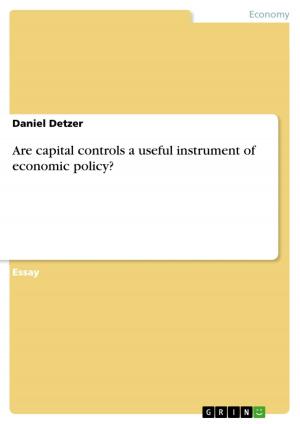Value effects through voting block acquisition - an empirical and comprehensive analysis for Germany
an empirical and comprehensive analysis for Germany
Business & Finance, Management & Leadership, Leadership| Author: | Dennis Eggert | ISBN: | 9783640120338 |
| Publisher: | GRIN Publishing | Publication: | July 28, 2008 |
| Imprint: | GRIN Publishing | Language: | English |
| Author: | Dennis Eggert |
| ISBN: | 9783640120338 |
| Publisher: | GRIN Publishing |
| Publication: | July 28, 2008 |
| Imprint: | GRIN Publishing |
| Language: | English |
Diploma Thesis from the year 2008 in the subject Economy - Theory of Competition, Competition Policy, grade: 1,7, University of Bonn (Finanzwirtschaftliches Institut), 73 entries in the bibliography, language: English, abstract: The question if and how the ownership structure influences the market value of a firm is one of the most extensive studied subjects in corporate governance. Three main determinants were identified during more than 30 years of research: 1. The size of the block 2. The legal and regulatory environment 3. The type of blockholder This work uses the acquisition of voting blocks by different types of acquirers (point 3) to determine how the shareholder structure in Germany (point 2) influences the valuation of a firm. It is demonstrated that the heterogeneity between block acquirers has to be taken into account, i.e. the size of a block (acquisition) itself (point 1) is not a distinctive enough instrument to determine valuation aspects. The main results are that a block acquisition by banks in Germany results in a negative value effect. A cumulated abnormal return (CAR) of -2.7% in the event-period [-20,20] is the (average) consequence of a block-acquisition by a bank. A strong and highly significant result is the positive valuation effect when hedge funds acquire blocks in their targets. Average cumulated abnormal return is 5% in the period [-20,-1]. Corporations as block-acquirer cause also positive CAR's (1%). No significant effects are found following the announcement by mutual funds, insurances and individual investors. The work proceeds as follows: In chapter 2 the literature on general corporate governance and especially the literature concerned with the relation between shareholder structure and valuation is reviewed. The data for this study and its legal sources is described in chapter 3 and chapter 4 gives a short descriptive statistic. The main chapter, chapter 5, starts with an explanation why the event-study methodology is especially eligible to answer the question of how blockholding influences valuation. Then the used methodology is described and the results of the empirical work presented. These are put in the context of the respective literature and research. Chapter 6 is a short summary of the most important findings and concludes the work.
Diploma Thesis from the year 2008 in the subject Economy - Theory of Competition, Competition Policy, grade: 1,7, University of Bonn (Finanzwirtschaftliches Institut), 73 entries in the bibliography, language: English, abstract: The question if and how the ownership structure influences the market value of a firm is one of the most extensive studied subjects in corporate governance. Three main determinants were identified during more than 30 years of research: 1. The size of the block 2. The legal and regulatory environment 3. The type of blockholder This work uses the acquisition of voting blocks by different types of acquirers (point 3) to determine how the shareholder structure in Germany (point 2) influences the valuation of a firm. It is demonstrated that the heterogeneity between block acquirers has to be taken into account, i.e. the size of a block (acquisition) itself (point 1) is not a distinctive enough instrument to determine valuation aspects. The main results are that a block acquisition by banks in Germany results in a negative value effect. A cumulated abnormal return (CAR) of -2.7% in the event-period [-20,20] is the (average) consequence of a block-acquisition by a bank. A strong and highly significant result is the positive valuation effect when hedge funds acquire blocks in their targets. Average cumulated abnormal return is 5% in the period [-20,-1]. Corporations as block-acquirer cause also positive CAR's (1%). No significant effects are found following the announcement by mutual funds, insurances and individual investors. The work proceeds as follows: In chapter 2 the literature on general corporate governance and especially the literature concerned with the relation between shareholder structure and valuation is reviewed. The data for this study and its legal sources is described in chapter 3 and chapter 4 gives a short descriptive statistic. The main chapter, chapter 5, starts with an explanation why the event-study methodology is especially eligible to answer the question of how blockholding influences valuation. Then the used methodology is described and the results of the empirical work presented. These are put in the context of the respective literature and research. Chapter 6 is a short summary of the most important findings and concludes the work.















